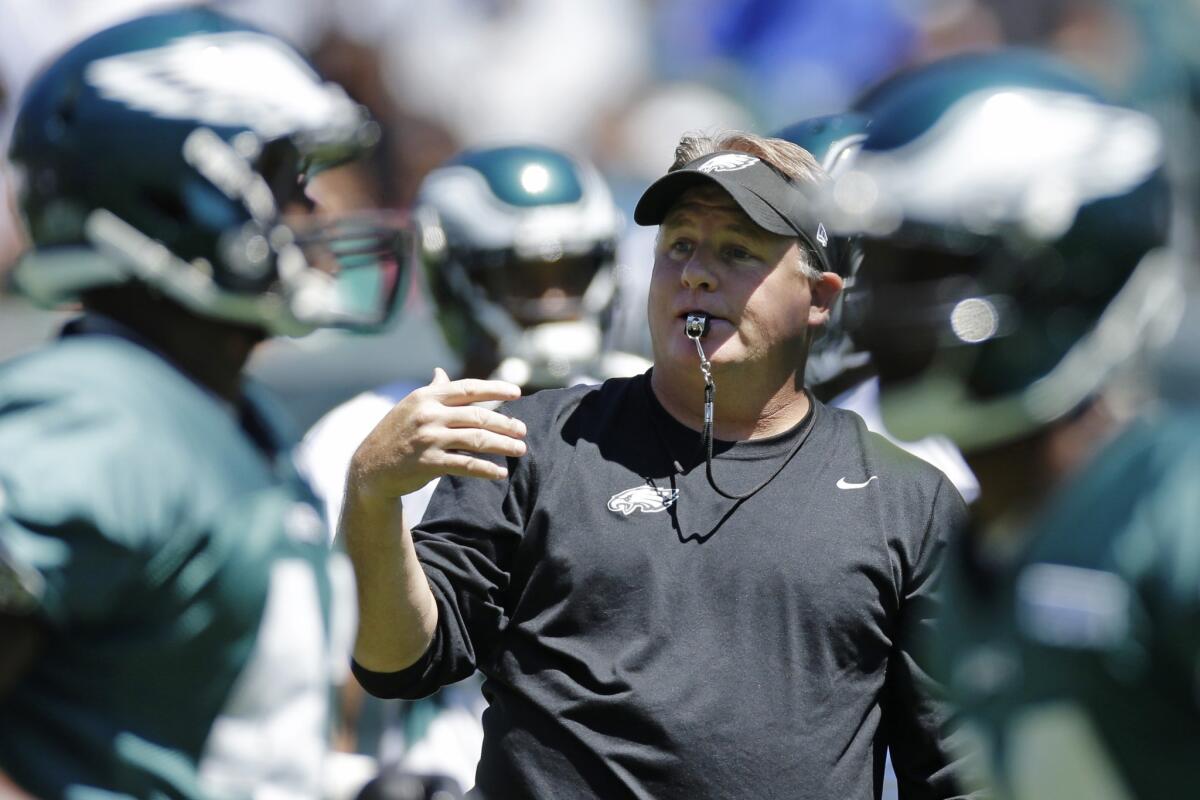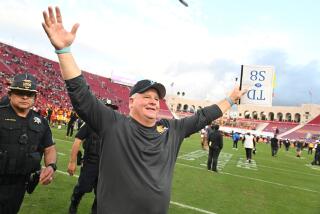It’s game on for NFL’s new coaches, especially Eagles’ Chip Kelly

- Share via
In keeping with tradition, the NFL sent questionnaires to its eight new head coaches during the off-season, quizzing them on random topics. Among the questions was, “Who has the hardest job in football?”
Answered Chip Kelly of the Philadelphia Eagles: “No one. It’s a game.”
Here’s betting we’re going to enjoy this guy.
For years, the Eagles had the least quotable coach in football — Andy Reid, who’s now in Kansas City — and suddenly they have the most quotable.
Of course, Kelly is looking to put a more significant stamp on the game than his sense of humor and, in this case, perspective. He’s an offensive innovator, first at New Hampshire and then at Oregon, and his play-calling is even quicker than his wit.
“I think Chip Kelly is going to have as much influence on the game and the way it’s played now as anyone,” Hall of Fame coach John Madden said. “If for no other reason, just the pace of the game and the number of plays.
“Everyone talks about it: Can Chip Kelly do what he did in college? Probably not in its entirety, but he can do a lot of it. Not only that, everyone else is going to do a lot of it.”
When people talk about Kelly, they almost always talk about his offenses. But the quality of Philadelphia’s defense is equally important. Consider this: If the Eagles can’t move the ball, and they’re running plays in rapid-fire succession, their defensive players will barely have time to take a few drags off the oxygen masks before they’re back on the field.
Kelly said the offensive decisions he made as a college coach were always predicated on what kind of defense he had.
“I had total faith in our defense, so I wasn’t averse to putting our defense on the field in any situation,” he said. “I think a lot of that has to do with you making decisions. It’s a risk-reward. What’s the reward? Obviously, you get a first down. What’s the risk? You’re turning the ball over at that point in time on the field. So are you comfortable enough with your defense to put your defense on the field in that situation?”
A glimpse at the seven other new coaches:
REID, Kansas City: The only coach in this year’s crop who had been a non-interim NFL head coach before, Reid coached the Eagles for 14 seasons, going 130-93-1 in the regular season but only 10-9 in the playoffs. Philadelphia parted ways with him after an 8-8 record last season.
Alex Smith, discarded by San Francisco despite being among the league’s highest-rated quarterbacks after he suffered a concussion and subsequently lost his job last season, joins Reid in Kansas City.
The way Smith sees it, he and his coach have something to prove.
“We’d love to stick it to everybody who thought we couldn’t do it, he and I included,” Smith told the New York Times recently.
MIKE McCOY, San Diego: The Chargers, once routinely a lock to make the playoffs, have missed them the last three seasons. As a response, they dumped Norv Turner and General Manager A.J. Smith, and brought in the youthful McCoy, 41, most recently of the Broncos, and GM Tom Telesco, 40, of the Colts.
McCoy has familiarity with “presto-change-o” transformations. Two years ago, when the Broncos made the abrupt switch from more traditional quarterback Kyle Orton to scrambling, rambling Tim Tebow, offensive coordinator McCoy essentially tore up the playbook in the middle of the week and started fresh.
McCoy has Philip Rivers getting the ball out quicker — essential with an offensive line under construction — and has brought in Ken Whisenhunt and Frank Reich to help formulate the offense, along with Rivers.
“The thing about Mike is, he’s got a plan,” Rivers said. “He didn’t just say, ‘I’ll figure it out as I go.’ He’s got a way he wants to do it. That’s clear. When you go .500 the last three years, you’re ready to believe. You’re tired of being .500. You’re ready to say, ‘All right, I’ll sign up. I’m in.’”
MARC TRESTMAN, Chicago: The Bears didn’t just think outside the box in replacing Lovie Smith, they thought outside the border. The 57-year-old Trestman, one of 13 candidates to interview for the job, was head coach of the Canadian Football League’s Montreal Alouettes and wasn’t a finalist in any other cities.
He’s rich with experience in this league, though, having made nine NFL stops between 1985 and 2004, usually as a quarterbacks coach, offensive coordinator, or both.
With Jay Cutler heading into the final year of his contract, maybe Trestman can be the quarterback whisperer and get the most out of him.
ROB CHUDZINSKI, Cleveland: For a coach who showed so much creativity with Cam Newton in Carolina, Chudzinski comes across as dry and by-the-book in person.
In the survey, for instance, asked what he would be doing if he weren’t coaching, he wrote: “Working in a business field.”
He certainly needs to get down to business with the Browns, who have made the playoffs only once since re-forming as a franchise in 1999. He hired Turner as his offensive coordinator, and has a cornerstone running back in Trent Richardson, who can shoulder much of the load on that side of the ball.
GUS BRADLEY, Jacksonville: Of the eight new coaches, Bradley is the only one with a defensive background. He was defensive coordinator the previous four years in Seattle, and has the same type of boundless enthusiasm and energy as Seahawks Coach Pete Carroll and Jon Gruden, who was head coach in Tampa Bay when Bradley was a defensive quality-control coach.
“I had a vision of how I wanted to treat people and handle players,” Bradley said. “In Seattle, it was really brought together. Me and Pete are similar in personality. We’re intrigued by competition, by bringing people together. It’s a driving force for us.”
DOUG MARRONE, Buffalo: Marrone, formerly head coach at Syracuse, was hired to replace Chan Gailey, who was fired after three consecutive losing seasons.
The line of hurdles is getting longer, as the Bills lost their top two quarterbacks to injury this summer. Kevin Kolb is out because of a potentially career-threatening concussion, and first-round pick EJ Manuel is recuperating from a surgical procedure on his knee.
Manuel returned to practice Sunday, ahead of schedule, so it looks as if the Bills won’t have to turn to undrafted rookie Jeff Tuel to face New England in the opener. Still, Marrone faces an uphill struggle to return the Bills to respectability.
He feels comfortable in the NFL, though, and could adjust more quickly than some coaches who make the jump from college football. Before he was hired at Syracuse, Marrone was offensive coordinator in New Orleans from 2006 to ’08. Prior to that, he was a New York Jets assistant.
“I think it was a much more difficult transition for me going from being in the NFL for seven years and going back to Syracuse,” he said, “than it was for me leaving Syracuse and going back to the NFL.”
BRUCE ARIANS, Arizona: Arians made history in Indianapolis last season when, in replacing cancer-stricken Chuck Pagano, he led the overlooked Colts to the playoffs and became the first interim to win NFL coach-of-the-year honors.
Now, for the first time in his 60 years, the longtime offensive architect gets a chance to be more than a stand-in head coach. So far, he doesn’t sound concerned about taking over what looks to be the weakest team in the strongest division.
“It’s just football,” he said. “The AFC North [where Arians was offensive coordinator in Pittsburgh], I think it was as tough as there was for a long time. I don’t know if it is anymore. But it reminds me a lot [of that], because we’ve got physical defenses, teams that like to run the ball in San Francisco and Seattle and St. Louis. Had we been like 0-20, I would be worried about it. But we just beat these teams. And so we can beat them again.”
Arians has a keen sense of humor, which should help. On the survey, he was asked about the last book he read.
“The Arizona Cardinals’ playbook,” he wrote. “By Bruce Arians.”
Twitter: LATimesfarmer
More to Read
Go beyond the scoreboard
Get the latest on L.A.'s teams in the daily Sports Report newsletter.
You may occasionally receive promotional content from the Los Angeles Times.











